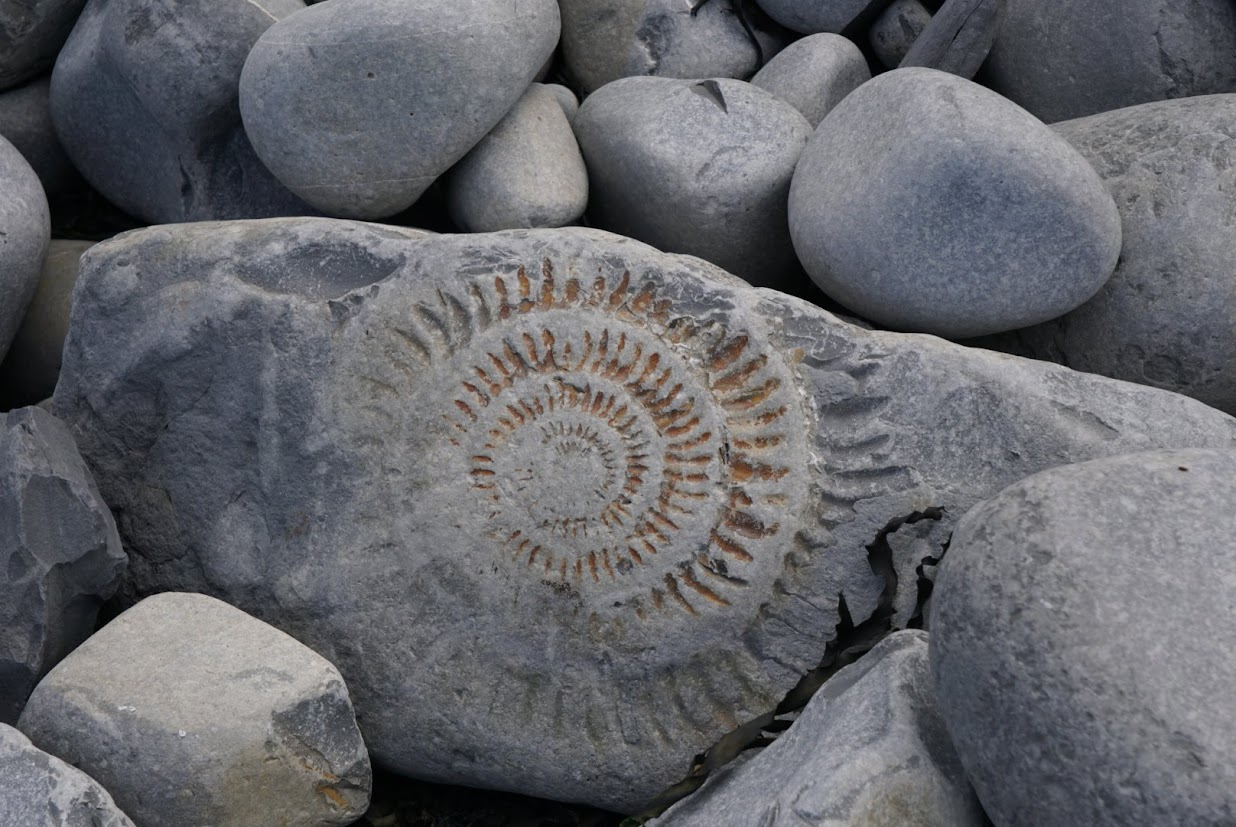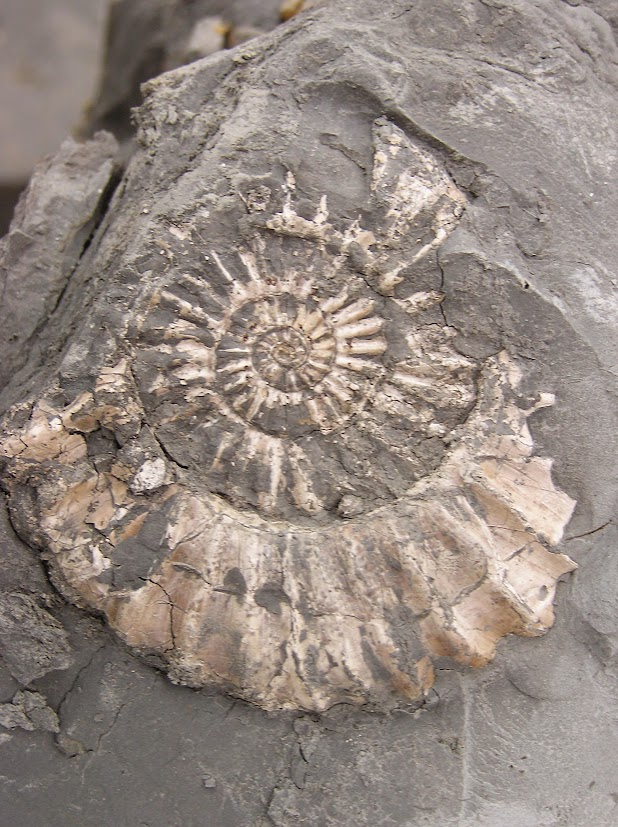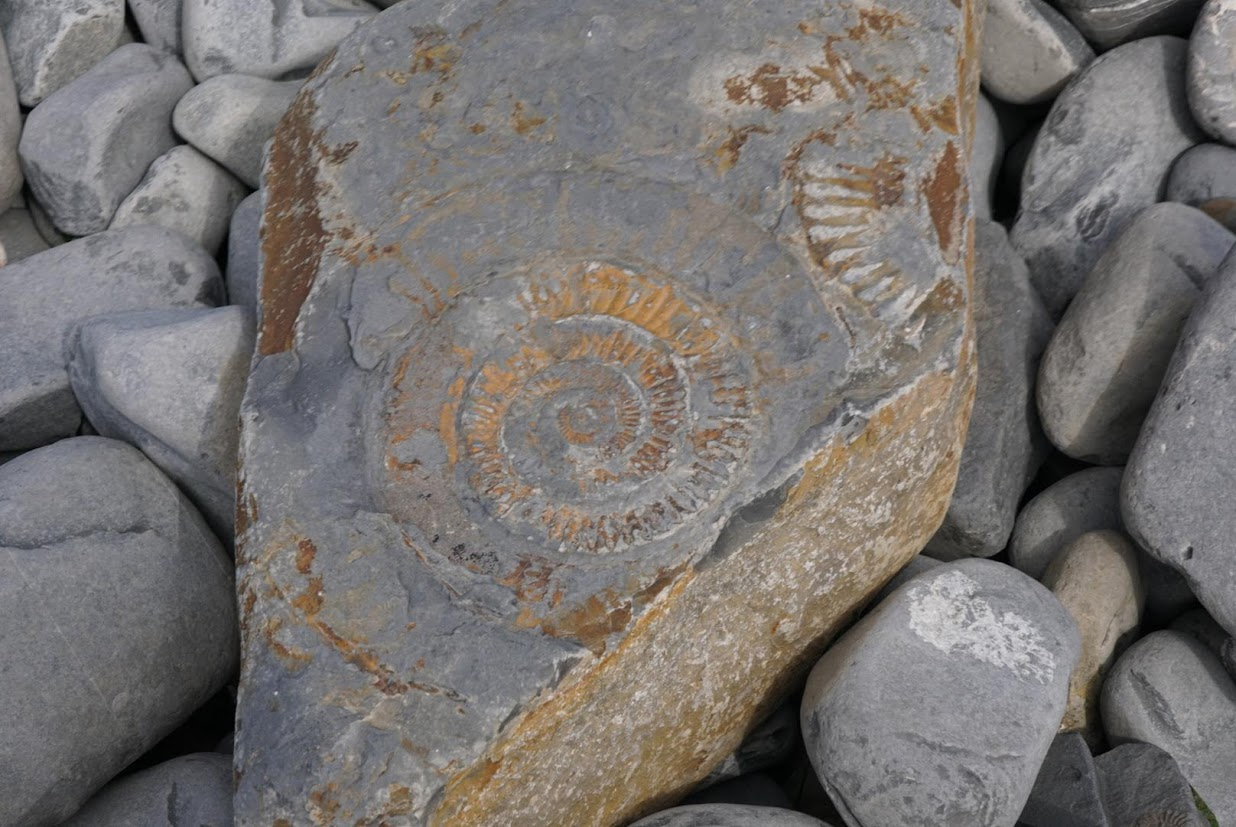I've been sitting in the soil of the fiddle leaf fig for a long time. I don't mind. I come from the land of dinosaurs after all, so being under the great leaves of the fig feels appropriate. I'm also not really fussed about time, if I'm honest. I spent thousands of years knocking up against other rocks, buffeted by the cold English channel, clinking against bones and shale. Twenty years in the possession of River doesn't mean much. She'll be ash when I'm on someone else's bookshelf.
Still, there's something about humans that moves even a rock fossil like me.
I remember the day she found me. It was cold, the time of the solstice, where the winter sun glows dully, and human cheeks are red against the icy coastal air.
She was saying that she's not good at finding things, but still, her eyes scanned the rocky shore and finally saw me. She shouted with glee - a fossil, look! An ammonite! I didn't know I had a name, and would spend years rolling it around my rock self until I became more fully the object she had named in human language.

There was many like me, on this shore. If she spoke my language, or I hers, I could tell her the exposed and hidden ones alike. In the end, she had more to tell me, as she talked to people about her favourite object in her possession. I'm older than I thought - how us rocks lose track of time - and I'm part an extinct marine animal. If I could feel, perhaps it would be a twinge of sadness - we have seen many beings live and die over the millenia and I hadn't realised I was part-creature, or at least the echo of one. The coiled shell of the creature, related to squids and octopus, have a coiled, spiral shell divided into chambers that used gas and liquid to control buoyancy in the water. As much as I am heavy now, part of me was buoyant once. Ammonites like me are used by geologists to help date the age of the rocks in which they’re found - we are important, she says. Our name, too, reflects this grand perception of objects of the past - we're named after an Egyptian god, Ammon, who has ram's horns.
But on the day she found me, I didn't know any of this, and I don't think she cared much for geology at all. She was flushed with love, walking on the Jurassic coastline with a man she's known for twenty four hours. Neither of them had sleep. I could feel energy pulsating between them, a human magnetism perhaps us rocks could feel because we too remember pressure and heat, bonding and shifting over eons. The low winter sun hung above the horizon, skimming the North Sea at an angle that made the water silvery. Shadows stretched long, lengthening themselves flatly over pebbles and sand, and I lay there, half-buried in the shingle, waiting to be noticed. Perhaps I even wanted to be held in warm human hands - over the years, children have picked me up and thrown me, hot sunburnt feet folded soles over my form without noticing what I was.

The stars would rise in a tight, familiar arc tonight as these two started their relationship. They'd plan a whole life within days - speedy in human terms, who enter love more cautiously. The same constellations sailors have used to navigate these coasts for centuries would blink over the map they'd imagine of their lives together.
In this first moment, she shouted - 'fossil!' and lifted me with careful hands, brushing the cold grit off my spiral shell. I was hers now, for a little while, absorbing her warm wonder as she marvelled at this fragment of deep time. It was a collion of past and present, human warmth against ancient stone, and though I thought this would be a brief moment, she would feel this every time she picked me up or saw me on the windowsills of various houses she'd put me over the years, or in plant pots where I nestled with other found objects - shells, fossils, painted rocks.
I would travel with her to Australia, observe their relationship spark with the early heat of it's first tempering, the arguments as they found their rhythm, the passion, and then the quiet loving that older human relationships find. One day I will be some other humans, or discarded, perhaps, back to the earth, hopefully back to the sea that I once came from. For now, I'm moving closer to the ocean at least, with her, as she plucks the fossicked things from beneath the fiddle leaf and pops them in a bucket, ready to take to their new home down the coast.

This was in response to 'The Secret Life of an Object' - this week's theme from Silver Bloggers - 'choose an object from your past—a favourite toy, an old piece of furniture, a cherished photo album or anything else and tell its story from its perspective.'. I'd love to share a photo of said fossil, but it's packed to go down to the new house. Still, these photos are of ammonites in situ in the South West of England, so are good substitutes.
With Love,

Are you on HIVE yet? Earn for writing! Referral link for FREE account here